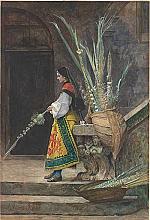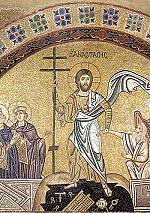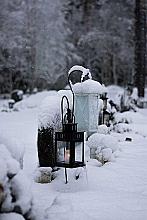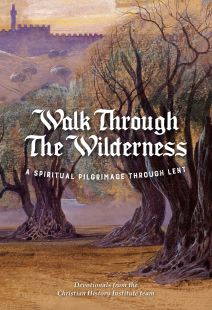Lent Week Five
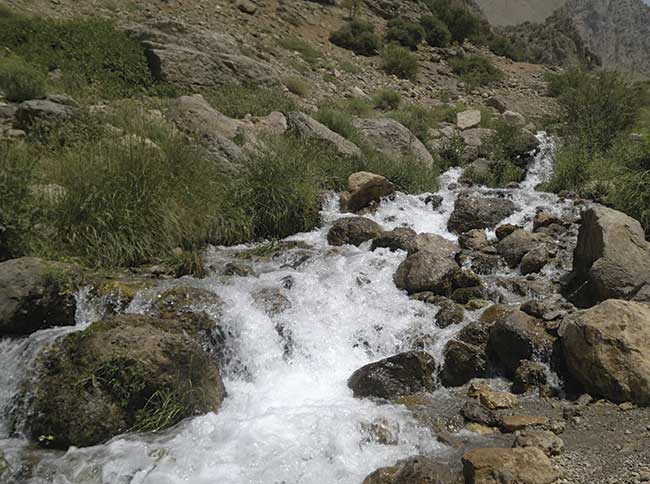
[Spring Mishi Sisakht—Milad Gerami / [CC-BY-SA 3.0] Wikimedia]
Fifth Sunday
Do not remember the former things, or consider the things of old. I am about to do a new thing; now it springs forth, do you not perceive it? I will make a way in the wilderness and rivers in the desert.
(Isaiah 43:18–19)
Out of the depths I cry to you, O LORD. Lord, hear my voice! Let your ears be attentive to the voice of my supplications!
(Psalm 130:1–2)
Very truly, I tell you, unless a grain of wheat falls into the earth and dies, it remains just a single grain; but if it dies, it bears much fruit. Those who love their life lose it, and those who hate their life in this world will keep it for eternal life.
(John 12:24–25
Monday, Fifth Week of Lent
How beautiful the picture given, telling us of the river of blessing that flows all through our lives, and we have only to reach by faith and praise to find our wants supplied in the most barren desert.
—Lettie Cowman (1870–1960), Streams in the Desert
Where I live in Pennsylvania, water scarcity is almost never a problem. Wells and waterways are everywhere. I’ll never forget how jarring it was when, on a flight to San Diego, I looked down and saw the desert for the first time. It stretched on and on—miles of emptiness that I knew were far vaster than I could really comprehend, given my bird’s-eye view. As we drew closer to our destination, we flew over a reservoir. I knew it had to be huge, but in the middle of that barren expanse, it looked small and insufficient. Just recalling it now makes me want to reach for a tall glass of water.
God’s people understood the power of such thirst in the desolate places. Their prophets and psalmists pictured it often with spiritual implications, displaying just how barren the wilderness of our lives will be without the One who makes the waters flow. When Jesus walked the earth, he pointed the woman at the well to the “living water” that only he could give: the water that will spring up within for eternal life (John 3:14). God, the wellspring and from whom all our blessings flow, is the only source of our satisfaction. And as Lettie Cowman reminds us, that relief is never far off. The river of his blessing flows ever on through the desert places, never diminishing, always satisfying. We need only reach out, cup our hands in the flow, and drink. —Kaylena Radcliff
Tuesday, Fifth Week of Lent
The gate that gives entry into these riches of his wisdom is the cross; because it is a narrow gate, while many seek the joys that can be gained through it, it is given to few to desire to pass through it.
—Juan de la Cruz (1542–1591), “Spiritual Canticle”
When I began to walk the way of Alzheimer’s with my husband several years ago, God stood at the narrow gate and beckoned me in. I had little choice but to enter. Without its narrowness, how would I know the wideness of God’s mercy? Without the darkness, how would I see the light of Christ? Without the wound, how would God enter my heart? These are the tensions that I embrace and the mysteries that I face as I continue along the path.
When I was confirmed at age eight, my father inscribed my brand new Book of Common Prayer: “Never deny a mystery, it is a link to all that is possible. Even love.”
So I give thanks to God for his immanent presence in my life, particularly in the dark and narrow and wounded places. He’s met me there, with his light, his breadth, his healing, and his love.—Meg Moss
Wednesday, Fifth Week of Lent
Thousands of the flock of Christ can testify that when they have put themselves absolutely into His hands, He has quieted the raging tempest, and has turned their deserts into blossoming gardens.
—Hannah Whitall Smith (1832–1911), The God of All Comfort
Several years ago, a large purplish-blue pigeon took up residence in my yard. He waddled around and seemed to be looking for something. When he was back the second day, we named him “Bert,” brought him water, and tried to figure out what to feed him. Day after day there was Bert, waddling around, refusing our food, and always staying just out of reach.
An internet search soon confirmed our suspicions: Bert was a homing pigeon who had lost his way. He was someone’s pet and the federal government protected him against harm. All our efforts to help him were fruitless. Day after day he grew weaker until finally on day seven we were able to get close enough to photograph his identification band. Minutes later we located and phoned his owner. It turns out Bert was really Bertha, a young female homing pigeon who had taken a wrong turn on her maiden flight.
Though she was in great distress, Bertha would not allow us nearby. Once her rightful owner arrived, she immediately went to him and quickly received urgent care. Bertha knew her owner so well that she waited for him even when close to death.
I don’t know about you, but I have trouble waiting for God when I’m in distress. My first instinct is to wallow in the “raging tempest” and search for a human escape from the desert. Bertha reminds me to listen for the voice of the One who knows me best, who hears my cries, and who can lead me on the path of wholeness. —Dawn Moore
Thursday, Fifth Week of Lent
You are the great High Priest; you have prepared the feast of holy love;
and in our mortal pain none calls on you in vain; our plea do not disdain; help from above.
Clement of Alexandria (c. 150–c. 215), translated by Henry Dexter (1821–1890)
What role have psalms played in your life of prayer?
For me they’ve been instrumental in teaching me to call out to God from the depths. Psalms teach us brutal honesty with God. We could paraphrase Psalm 130 with something like, “God, I’m in the pit. Listen to me!” I love the rawness and directness of this prayer—not polished or polite but rather a bold cry from desperation.
I’m so encouraged that both the psalms and the early church sometimes provide exactly the words I need to say to God. Especially when my own words fail me. I remember a time when the pit felt so deep that I had very few words for God. It was through singing the words of Psalm 13 in a choir that I could finally find expression for the prayers of my heart.
Clement’s words echo the psalmist, pleading for God to listen to our desperate cries from the depths. Yet both teach us to articulate our despair and our hope, almost in the same breath. Clement describes God’s holy feast of love, reminding us that our prayers are not in vain. The end of Psalm 130 instructs the people to hope in God. Even from the depths. Even when despair sets in. Even when all we can do is call out: “God, listen to me! It’s really bad down here.” Praying the psalms doesn’t brush over our anguish but brings it to God and reminds us that we can truly put our hope in God—even when God feels ever so distant.
What part of Psalm 130 speaks to your heart today? Can you pray these words to God?—Michelle Curtis
Friday, Fifth Week of Lent
Who was that grain? It was the Lord Jesus. In the whole universe God had only one “grain of wheat;” He had no second grain. God put His one grain of wheat into the ground, and it died, and in resurrection the only begotten grain became the first begotten grain, and from the one grain there have sprung many grains.
—Watchman Nee (1903–1972), The Normal Christian Life
Can’t you see it? Passover celebrants waving palm branches and shouting praises of “Hosanna! Blessed is he who comes in the name of the Lord! ” as Jesus rides a donkey down the Mount of Olives. So many people were there, both Jews and Greeks, that the Pharisees’ fears of “look, the world has gone after him!” (John 12:9) seem to me a joyful prediction rather than a nervous accusation.
I spent the fall of 2022 in Jerusalem, studying the land, reading ancient texts, and feeling the Bible come alive in front of my eyes. During one of our field studies, we descended from the Mount of Olives down through the Kidron Valley and up to Jerusalem’s walls—the same path Jesus would have taken on his final journey. The path is steep, winding, and even to this day thronged with people. At the bottom sits an enclosed garden of olive trees surrounding the Church of All Nations, the place tradition says Jesus went to pray before his arrest (John 18). In John 12 Jesus declares that his death would “bear much fruit” to the glory of God. In 18:27 Jesus shows his feelings about this greatest of sacrifices: “Now my soul is deeply troubled. Should I pray, ‘Father save me from this hour?’ But this is the very reason I came!”
The Greeks who cautiously approached Jesus here received eternal hope: “Very truly, I tell you, unless a grain of wheat falls into the earth and dies, it remains just a single grain; but if it dies, it bears much fruit” (John 12:24–25).
The parabolic statement so typical of Jesus is eloquently summarized here by Watchman Nee. We also visited eight different monasteries. Some are ancient ruins, requiring a vivid imagination to reconstruct their brilliance. Others are still active. Each monastery has a different belief about how God should be worshiped: Catholic, Romanian Orthodox, Greek Orthodox, Syrian, Ethiopian, Protestant. And still these many grains all point to “the only begotten grain,” Jesus. —Kellie Mitchell
Saturday, Fifth Week of Lent
I am the wheat of God and am ground by the teeth of the wild beasts, that I may be found the pure bread of Christ.
—Ignatius of Antioch (d. 107), “Letter to the Romans”
My career as a church historian did not begin auspiciously. In my very first course studying church history in seminary, I mixed up Ignatius of Antioch and Ignatius of Loyola on a test. Almost 1,500 years separate these two saints of the church—one a first-century bishop and martyr and one a sixteenth-century founder of a missionary religious order.
Like many of the earliest church fathers and mothers, we know little about the life of the earlier Ignatius beyond his role as a leader of the growing Christian community and what is recorded in his own letters. Tradition holds that he was a disciple of the apostle John.
Even his journey to Rome for his martyrdom is confusing—those convicted of being Christians were usually executed locally. His captors seem to have taken him by a very indirect route, allowing him to meet with growing churches and to send many letters to other churches and to Polycarp, bishop of Smyrna. We’re not even sure which emperor Ignatius was executed under.
Despite all these unknowns, it is clear that Ignatius cared for his colleagues and disciples—writing to them about everything from theological debates to practical aspects of church management. He also clearly knew and accepted his fate.
His language here recalls that of the Lord Jesus Christ, the One who told us to eat his body and drink his blood, and who reminded us that “unless a grain of wheat falls into the earth and dies, it remains just a single grain; but if it dies, it bears much fruit” (John 12:24).
Holy Week is upon us. Let us walk the way of the cross.—Jennifer Woodruff Tait
By CHI Staff and Associates
[Christian History originally published this article in Christian History Issue #143+ in 2022]
Next articles
Holy Week in Lent
Scriptures and meditations for Passion week (holy week) in Lent
CHI Staff and AssociatesDay 1. A Lantern for the Stable
The shepherds laid aside their plans and chose to present themselves to Emmanuel.
Diana Pavlac GlyerSupport us
Christian History Institute (CHI) is a non-profit Pennsylvania corporation founded in 1982. Your donations support the continuation of this ministry
Donate



